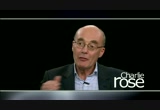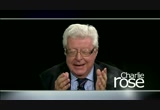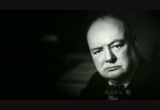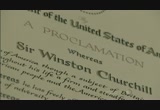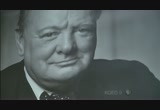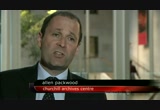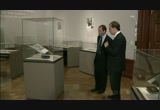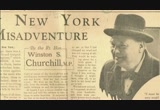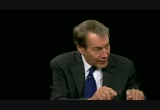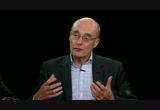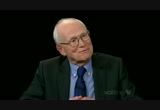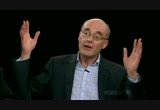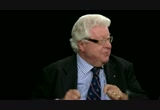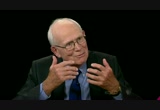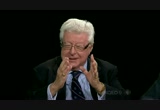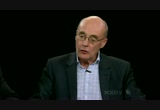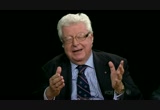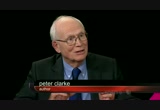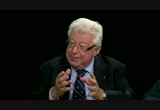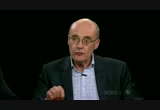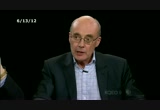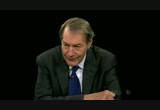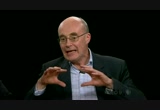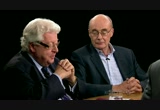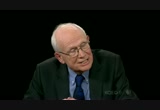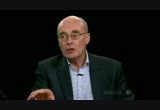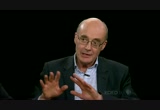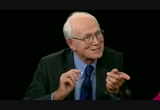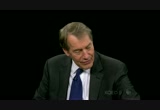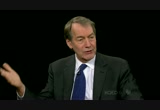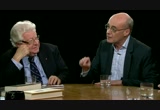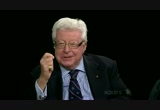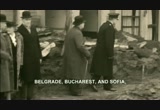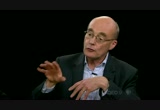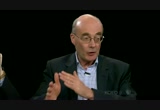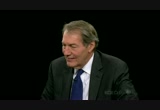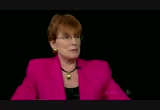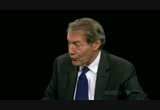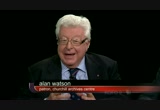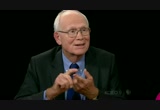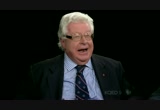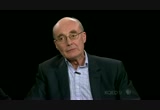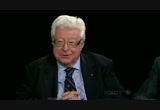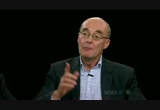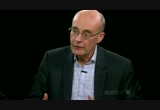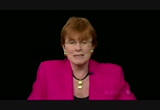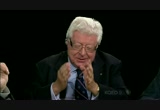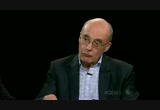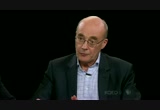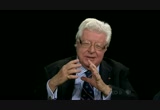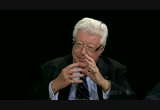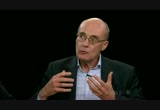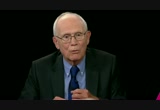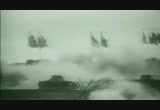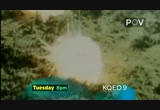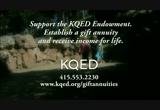tv Charlie Rose PBS December 3, 2012 12:00pm-1:00pm PST
12:00 pm
of the other politicians really can do or want to do. of course what churchill really wants to do is run the whole war. he wants to be a general. he is a man of enormous courage. we love to be on the front line but what is tremendously important is he is a man who understands the power of words but also understands and almost relishes the possibility of a fight. >> but his politicians was his-- writing as he always said himself, was his profession. and of course the two things then add up. because when he looks back on his 80th birthday and he's complimented on his great speeches of the war he says to the combined houses of parliament, he says you must remember, if i found the words, i have always earned my living by my pen and by my tongue. >> whenever he would need money he would write an article, start a book, do something. which is why at the end of the war when he hadn't been able to do any of that, and there was no pay, so he wasn't earning any money at
12:01 pm
all, that he had to put his beloved house up for sale because he was bankrupt. the duke of wellington got number one london, the duke of moreberg got glenen palace and winston churchill got bankruptcy. a sign of the time. >> he had physical guts but he also had an acute awareness of who he was, the family he came fromment and i always remember some years ago going to blenham with a group of german parliamentarians. >> rose: the family home. >> where he was born, and the german member of parliament sitting next to me had never been to blenham before. and as we turned in and went up the drive, he turned to me and said if adolf hitler had known that winston churchill was born here, i don't think he ever would have gone to war. >> rose: winston churchill for the hour next. >> funding for charlie rose was provided by the following:
12:03 pm
captioning sponsored by rose communications from our studios in new york city, this is charlie rose. >> we shall go on to the end. we shall fight in france. we shall fight on the seas and oceans. we shall fight with growing confidence and growing strength in the air. we shall defend our island, whatever the cost may be. we shall fight on the beaches. we shall fight on the landing grounds. we shall fight in the fields and in the streets.
12:04 pm
we shall fight in the hills. we shall never surrender. >> rose: winston church sill recognized as one of the greatest statesmen of all times. in 1954 edward r. murrow the cbs newsman said he mobilized the english language and sent it into battle. president kennedy liked the quote so much that he used it as his own. that was in 1963 when he granted winston churchill honorary citizenship of the united states. >> pierpont morgan was a friend of churchill's mother and is likely that winston on one of his many trip to its united states would have visited this library. we're joined today by alan packwood, he is the director of the churchill archive center in cambridge. and he's cure rating an exhi business here at the morgan called winston churchill, the power of words.
12:05 pm
>> what you're looking at here are two images taken by the famous photographer on the 30th of december 1941. winston churchill had just addressed the canadian parliament and he had made his way to the speakers chamber. he was looking for a drink, perhaps also for a cigar. and what he found instead was a photographer waiting for him. and more than that, because the photographer insisted on removing churchill's cigar. and then photographed the ensuing skoul. and it's clear that a few moments later the british prime minister lightened up and smiled for the camera. >> which do you think is truer to the real churchill? >> i think they captured two facets of winston churchill, and two facets that we emphasize within the exhi business here. you've got the public figure, resolute, defiant. and then you've got the private man, the man behind. >> it's just wonderful to be bringing churchill back to new york. this was a city in which his mother was born. this was the american city that he visited more than
12:06 pm
any other. >> what you're looking at here is the grant of honoring u.s. citizenship to winston churchill and of course you have there the citation signed by president kennedy and then the u.s. passport which sadly wynton churchill never used. >> so in other words, as much as churchill loved america, america loved churchill. >> absolutely. and that really is what this exhi business is all about. >> churchill was a great reader and writer of history. he engaged with history. and that's with american history just as much as european history. >> so the bromance between fbr and winston is one of people's favorite stories in the second world war. and here it is, a present from roosevelt to churchill in his 70th birthday. what exactly is it. >> these are lines by abraham lincoln that roosevelt will sent churchill for his 70th birthday and a wonderful inscription where he has written at the bottom for winston on his birthday, i would go even to-- to within
12:07 pm
him again. >> and church sill someone who lived by his pen. his whole career is underpinned by writing. >> he actually rarely put pen to paper himself. so what is the significance of this typewriter you have in the exhi business. >> are you absolutely write. churchill favorite method of working was by dictation. and this is what was then a state of the art silence typewriter, so that his secretaries could take down this torrent of words without disturbing his flow. >> and that there looks like the nobel prize. >> absolutely. this is churchill's nobel prize for literature. awarded for the totality of his written and spoken words. so we couldn't hope for a better center piece for an exhi business which is about the power of words. >> i think one of the most interesting things about churchill is because he was first and foremost a writer, because he had been a war correspondent himself, because he wrote for the newspapers, he does have an understanding of how the
12:08 pm
media works. so while he is using these speeches to rally domestic morale he's also simultaneously sending a message of defines to hitler, a message of hope to occupied europe and of course in 1940 and 1941 an a meal for great support for the united states. >> give us the tool and we will finish the job. >> one of my favorite documents within the exhi business, churchill was in new york in december 1931. and was knocked down by a motorcar on fifth avenue at 76th street. and it was the classic mistake of the brit in america and he got out of his taxic-- taxi, looked the wrong way and was immediately hit by a car going the other direction. what he did was two things. he wrote an article on what it was like to be hit by a motorcar. but he also managed to persuade his doctor in prohibition era new york to write him a prescription necessitating the use of alcohol at all meals.
12:09 pm
>> rose: joining me now is celia sandys, winston churchill's granddaughter, david reynold-- renolds of cambridge university, peter clarke on the recently published mr. churchill's profession and i am pleased to have all of them here at this table. thank you. >> rose: i so looked forward to this i was go-going to tell a story that i once went to see christopher stones and he showed me something that he had received and had learned from winston churchill was how to diagram a speech, you know, in terms of indentation so that when you read it you read it win flexion and passion you know clearly about this is that what it said. >> he srt of sloped each paragraph. >> so you instantly had a sense to make the reading of it more as if you were simply coming from your heart.
12:10 pm
>> it is frankly boring to actually go when you set it out. and you don't have a secretary to do it, it's not so easy to make it. >> it's a lot of work but it is very much easier. >> was the love of language and words did it come early to churchill? >> i think so, he said that because he was a hi school dropout, he was right at the bottom. he did -- to sort out english language, he said the structure of the english sentence was really got inside my bones. he said it is a noble thing. and i think he had that from an early stage of language and it its capacity. >> and all of his life developing. >> and also to some extent, winston churchill was self-taught. i think he therefore had the
12:11 pm
relationship that people learning from language have with books which is different than the relationship of people simply taught about books he. >> i think how stupid he was at school, very often exaggerated at least i think his father behaved disgracefully. he had an expensive oxford education but purposefully denied it to young winston. >> purposefully, for what reason. >> partly money. he was very conscious of the expense of sending winston to oxford. he suggested that the army was a more suitable career and then tried to bargain with him not to go to the cavalry, that might be too expensive there. that wasn't all together an easy relationship. >> but he sold to to winston churchill by saying you can be a great man of the army. >> he did. he tried to. >> he later discovered that he really was too stupid to
12:12 pm
go to the bar. he was very disappointed, that he thought his father thought he was, you know, was going to be successing -- --. >> rose: found out his father thought he was too stupid. >> his father was dismissive. >> horrid to him. >> winston always wanted his father's affection. even a poignant story late in his life after the second world war where he had had all these accomplishments where winston has this supposedly dream moment where his father comes back and winston starts to tell him all the things he, winston has done. and his father just says oh, goodness, you've had so many wars in the 20th century and fades away. and there's always this sense of almost try and stilt it to reach his father. >> the recognition was thought absent. >> and-- i mean one of the things that i found particularly fascinating with the archive actually in cambridge is, of course, you are brought very close to the actual words that he chose to deploy so that the
12:13 pm
sentence of arming the english language and sending it into battle was actually a literal-- for churchill. there is one speech in which he gives after the fall of france. and he works on this script, offering individual words because he understands that unless you get precisely the right words, it's not going to motivate. what he was about was motivating. he wanted to move people at that point. it's quite extraordinary. the crossing out of the words and rewriting. >> this arm style that you mentioned, churchill developed that because he used in his youth to be an orater, he wrote out the whole speech, he delivered it in the house of commons and one terrible moment in the house of commons he completely froze. and after that he said never again. so he wrote these speeches out in this style where i could carry on a small sheet of paper. colook at his audience, command his audience but be
12:14 pm
absolutely sure he had the script. >> never freeze. >> but he really worked and that was the essence of the speech writing, was this care with words. >> rose: he also t is said, understood the power of the pause. >> i'm sure he did. and the other point we shouldn't forget is that many of us might write a speech, literally, perhaps on our laptop these days and then try and deliver it but certainly in his later life winston churchill was dictating, so he was dictating it. >> to see what it sounded like. >> and practice in front of the mirror and he practiced and practiced and he practiced and i mean people would hear him practicing. and think that, you know, for instance once he was-- his valet said you called me sir, he said no, i wasn't calling you. i was addressing the house of commons from his bath. >> things continued to change between the verbal and the written. >> and his son in that sense
12:15 pm
is really rhetorical, i think. you can see it in the cadences. and you mentioned about the pauses. i mean he actually managed pauses in the house of commons which is very, very difficult. because if you keep silent, it's an opportunity for everybody else to dive in. and during many of the parliamentary passages of his career, of course, he was deeply unpopular. and people did not respect him. so i mean they thought he was, he was right. sow managed that. he always kept his nerve. >> one example of the pause, he gives a speech to i think the canadian parliament and he says how the vichi french said britain is going have his neck wrung like a chicken. he tells this, or builds up to it and says some chicken, some neck. >> rose: when, back to '93, '40, when he had been in the
12:16 pm
wilderness, 29, and had seen the coming of hitler and argued passionately within the counsel of government. how was that received at that time? >> well, in the middle of the 30s he was regarded as a real nuisance because he was talking about hitler but he was also making a fuss about other issues about india, all the an by-- abdication in which he was felt to be way out on opinions. and the feeling is winston is making a fuss because he wants to get back into office. by 38y, 39y, particularly after munich there is a strong sense, actually, although winston is a nuisance he's right on the fundamental thing. and he is the great advantage for churchill is that when war comes, he is in a position of not having been tainted. he's not got dirty hands. he has a really clear record. can speak with authority. and there is an overwhelming desire to see him back in government. >> and he manages an extraordinary passage for
12:17 pm
the british parliament because there was this growing unease, particularly after munich, so many people deep in their gut knew that a terrible mistake had been made. and that became then a laugh because of the pace. and he manages to take that and turn it into resolution. and one of the things the speech he made, the first version of it, he isn't precise about, he actually says this makes no difference, words to that effect. then he realizes of course that is absurd and it makes a huge difference because britain is indeed isolated. america is not in the war. so it makes an enormous difference. and then he goes right to the point t makes no difference to our resolution. so he is all about resolution. it's turning fear, turning alarm, turning the difficulties such as the
12:18 pm
done qirk into resolution. >> when was the moment moment in which some people within the government were arguing some kind of-- some kind of understanding can be made with hitler and he made that famous speech to them about our last thought should be choking on our own blood having died on the battlefield. >> yes, that really was when churchill appealed over the head of his own war cabinet. a very small war cabinet, only four other men. churchill getting support really at that point only from the two labormen, not from the two conservative. neville chamberlain still kept on after had that sort of authority. churchill is mounting an argument within the war cabinet. but then in a bold move addressing the whole body of ministers. and appealing to them as though it were already a foregone conclusion, that
12:19 pm
they would follow his own instinct on them. and this of course cut the ground from under the feet of the over madness of the war cabinet. >> and there seems very strange between his instinct because what they shared was a realization that the british hadn't really been tested. and the instinct would have been that they wanted to be fair, they wanted to-- they wanted the trial of strength. and that was part of the resolve. and the idea -- >> they had made the mistakes, so therefore someone else comes along to do your job, you don't want them to do well. >> i think halifax-- halifax who is the foreign secretary, what he had said was look, we have lost, the french
12:20 pm
army is gone. there are no other allies. why don't we at least see if there are any peace terms on offer or via the italians. and halifax is talk more about like an arm i cities which is the kind of thing that the british had had a lot of times in the war against nap olean. churchill was absolutely right in have aing if you do that it is a slippery slope, you know, once that becomes known, you know, our morale will go down, what is interesting about church nil the summer of 1940 is that church hill no strategy for winning that war when we are alone. he talked about maybe the americans will come in. but basically he is convinced that the important thing for the moment is to show resolution and the future will somehow take care of itself. he said we fought the germans for four years in 1418. we had no idea what was going to happen. we almost gave up on victory and suddenly the germans collapsed in 1918.
12:21 pm
so church sill what is strike being this is this is a man who will given spiring leadership even if he knows, actually we're in a real mess at the moment. and i find what is interesting about churchill is his ability to convey public hope when he recognizes that the magnitude of the -- >> more than having a plan the most important thing was to rally the country. >> rally the country. the word resolution this say man who believes not only in the power of words but the power of emotional words. he knows how to touch the hearts of people in a way that halifax and chamberlain could not do and they knew it i mean to their credit halifax could have been prime minister in may 1940. he knows he's not a war leader. people understand that winston is going to be a war leader. he will rise to that challenge. >> it was churchill's gut instinct. >> it was his gut. >> as opposed to people without didn't have guts. >> guts is the right word because the bottom line for whatever you know, the
12:22 pm
personality of the man was such that although he could calculate and he could estimate the odds and he was many levels deeply realistic, i think he didn't have fear about the test. i think at the end of the day he believed that britain would come through it and he was right. he was absolutely right. >> rose: but here is what he said. if this long island story of ours is to end at last, let it end only when each one of us survives choking in his own blood upon the ground. >> and if one reads that, one inevitably thinks of the way that he applied his own sense of english history too. and the way that he applauds way back in english history figures like bodica as he so incorrectly called the famous queen and others who resisted tyranny, aggression,
12:23 pm
it is a view that is perfectly consistent in emotional terms, again, in terms of the gut instinct to which he is appealing rather than any rational -- >> it probably took him a long time to invent that sentence. i'm sure he took a long time to work that one out. this is a man who it is not just the power of words this is also a man who after all was trained as a sollier in his youthment and who actually did fight in the ba el. he says i killed people, people shot at me. and there is a sense in which-- there is a sense in which churchill is a military leader. he wants to be a military leader. he rises to that challenge in 1940 in a way that none of the other politicians really can do or want to do. of course what churchill really wants to do is run the whole war. he wants to be a general. he is a man of enormous courage. he would love to be on the front line but what is tremendously important are the man who understands the power of words but also understands and almost
12:24 pm
relishes the possibility of a fight. >> i think there are maybe one other chapter here though. of course he had physical gaffes but he also had an acute awareness of who he was, the family he came from. and i always remember some years ago going to blenham with a group of german parliamentarians. >> this is the family home. >> and where he was born. >> where he was born. and the german member of parliament sitting next to me had never been to blenham before. and as we turned in rand went up the drive, he turned to me and said if adolf hitler had known that winston churchill was born here, i don't think he ever would have gone to war. >> rose: there was this moment, is he harold ebens said only the will of one man-- under perm nemt sub jugation, he said everything prepared him for the moment
12:25 pm
that he entered 10 downing. my question was there no one else, i mean, that this is a rare moment in history where the only person-- person came together and head on with the opportunity he was uniquely suited for. no one else was suited for it and was best suited it for that circumstances. >> with some professional reluctance i would have to agree with you. professional because i speak as a historian. i am reluctant to attribute some up fluence to one person, and their intervention. but i think churchill in 1940, it is very difficult to imagine how that sort of leadership and the desperate situation could have been applied elsewhere. and his own sense of his own mission here was, i think, crucial in holding the situation. >> we tacked about the sense that the power he has in language, in mobilizing people's sentiments there is also this ability to direct war effort. the other thing i think that is striking is the way in
12:26 pm
which he really kicks into action the whole of the whitehall bureaucracy which has worked quite efficiently under neville chamberlain. he was not a fool. he was a good administrator but churchill has these famous, what would now be like post-it kind of things which says action this dayment and if he wants some minor bureaucrat to get going on an issue, he put, you know, action today on a memo. he's interrogating the whole bureaucracy, kind of like john kennedy used to do. don't just take it from the immediate person below you. find out what's going on. and you can see in some of the diaries of civil servants this sense that suddenly the machine is just gearing up to a completely different level. and 245 sense of a dynamo at work is the other thing that is really important. >> and it is, of course, a conjunction of him realizing that his position is unique. i felt as if i was walking with destiny. but also the conjunction is with a nation and a people who are at a unique point in
12:27 pm
their history. it's very easy now to just forget the degree of isolation, physical ice laying of great britain at that point. of course there was the empire, there was the commonwealth, there was the hope that one day the united states would become actively involved with its allies. but for that period he and britain are alone and that i think comes back to this thing of courage. >> its situation is extromly simple. you know, in politics and international life, most of the 20 ent century is complicated for most countries except for britain. in the summer of 1940 it becomes very simple. we are about to be bombed. we could be invaded there are no other allies, everybody has a sense of just gearing up for something really special. and so as allen said, you know, there is a man who sees that. and there is a country that is willing to ride for that. you goto years later, 1932, there is a real sense, you know, the war is dragging on,
12:28 pm
what is going to happen. we haven't got a victory, all the rest of it. the popular mood is different. but in 1940, it is a shining moment. and when churchill says in the second volume of his memoirs is called their finest hour t is, of course, regarded as his finest hour, the country's finest hour. and it's the moment still the british like to come back to because of this feeling that at that point as t.s. eliot said, history is now at england. >> he had to believe in himself before comake other people believe in him. >> yes. >> so this is where persuasion comes. >> he had to believe in himself before comake other people believe him. >> and de believe in himself. and he said i'm going to be prime minister. and he said it twice in his life that i know of, maybe more. but once when he was in india he said one day i will be prime minister. to one of his hates he was walking along with. and then in south africa he was having a drink in this bar and he told the station master of the local station, he said you mark my words,
12:29 pm
one day i will be prime minister of england. and the man rolled with laughter. >> on a familiar us-- famous occasion in 1944 where churchill is known to go in on d-day, if not the followup troops and the only way he can be dissuaded is by the king formally ordering him not to do so. so by then there is a very close hipp. but to begin with, george 6th remembers very well that winston was not his supporter. >> he wanted to go ashore on d-day. >> he wanted to go with the troops on d day. i mean churchill is a man of incredible physical courage. joseph-- josef stalin is always writing messages to churchill and roosevelt saying sorry, cannot come to conference, too busy with malses up front. stalin is scared of going anywhere near the front. he only does it once and he never gets near the line. churchill is always saying i want to be where the action is. if it's battle of britain he once stayed down in the budgeter, he goes on the
12:30 pm
rooftops and sees the passing firing. churchill would like to be there on d-day as near as possible to the action. >> when you say all that also, i think of the notion that he has said and would you know this best that he should have died in 19 4r5, did he not? >> there is a point at which after the-- he did say that didn't he. he was old and suffering and even-- had depression after -- >> there are times where he said i should is died in 1945 when i was at the height of my, the respect of my country and the respect of -- >> i think there are two things that he has a huge depression after losing the election of july 1945 when the labor party brought him. >> right. >> churchill has huge depression, his wife almost despairs over encouraging him again. but two things that keep him going are first the fact that he wants to be voted
12:31 pm
back as prime minister by the british people because remember in may 1940 he was not elected prime minister. >> right. >> it was if you like a kind of parliamentary code. and churchill had this very moving time in the summer of 1945 where during the election campaign he realizes he hasn't got, actually the words don't work. the kind of words he has been using don't work. iran, or you know got the people who want, you know, a piece and reform, he says i have no message for them. and that is, you know, that is a sense almost powerless for a man. >> just to finish though, so the point is that he wants to be voted back by the people he lead all through the war. and that is part of where he stays on in office or stays on in opposition as leaders. >> and that's really important. >> this is also where united states really comes in to the story. because churchill has this huge-- and the thing that changes it is the from you man-- truman basically persuades to come over and makes the speech about an iron curtain descending on
12:32 pm
europe. and the reaction in the united states and in britain is-- it takes a little time before people really wake up to what this warning means. but as the mood turns churchill returns, 1946, crosses the atlantic again, back to the united kingdom, he says of himself, the-- is rising again. he is reengaged but he needed a great issue like that. and he was the first person, really, to challenge the stalinist outcome at the end of the second world war. >> churchill, after '45 to the first 29 to 39, the glaet third is surge of churchill is he is out of office and can speak out. >> truman wants somebody to say those kind of things. truman sits with him on the
12:33 pm
podium but he can't say it. he has read that speech before. >> the iron curtain. >> he has read that speech, knows what he is going to say. >> in the adriatic and ire curtain has descended across the continent. behind that line lie all th the-- of the-- warsaw, berlin, prague, vienna, buddha pest, belgrade bucharest and-- all these famous cities and the populations around them lie in what i now call the soviet sphere. >> this is a convenient trial balloon forth administration when there is a lot of complaint a lot of protests in new york, when churchill comes, truman can stand back a little and say nothing to do with me. but actually churchill has
12:34 pm
helped to change the weather and that is important. the other thing about the iron curtain speech is the reminder of the power of words. churchill coined some of the most important sound bite its there, you know, modern diplomacy, iron curtain that is a phrase that is not unique to him but he popularizes it. special relationship, that is another churchillian phrase which has become a general term. >> at the time it is a main novelty. >> the other someone summit, the term sum sit foreone that churchill uses because of course although we think of him as the iron curtain man, about confrontations with the russians, he also says what we want is to parlay at the summit, to talk with the russians at the summit. he believes in diplomacy. he said. >> was the depression clinical depression or less than that? >> i think it was less than that. there was clearly a bipolar element to him using that
12:35 pm
nerm it-- term in an innocent skripted of way rather than a clinical way. he limb self recognized and he called it the black dog. >> he called it the black dog. >> the black dog has descended. and 9 way to throw the black dog off his shoulder was neweruous activity. displacement. >> a lot of painting. >> it could be painting. it could be writing. it could be politics. >> it was action. >> it could be building more dams at his country house. but action. >> purposeful action. this was a man, whatever he did he did it purposefully whether it was laying bricks or painting. >> what dow mean by purposeful, something he was doing and building. >> deliberate. >> his grandson winston, jr. said that, he said to me that his father once said, you know, every day in the evening i look in the mirror. i ask myself what have i done today, what have i actually done significantly. have i written an article.
12:36 pm
have i added to a speech, have i, you know, made some important political decision. he said this isn't important. you must do this you must interrogate yourself about this every day. he said as important as cleaning your teeth at the end of the day. and that sense of purposeful activity i think is absolutely basic to churchill. >> rose: writing was the way he made his money. >> oh, yes, my mother used to say we lived from pen to mouth. and whenever he needed money he would write an article, start a book, do something which is why at the end of the war when he hadn't been able to do any of that, and there was no pay, so he wasn't earning any money at all, that he had to put his beloved house up for sale because he was bankrupt. the duke of wellington got number one london. the duke of marlboro glenham palace and winston churchill got bankruptcy, a sign of the times. >> rose: when you were, when did you spend the most int at that time-- intimate time with him? >> well, as a child we used to spend our holidays there.
12:37 pm
but in my sort of more conscious memory, when i was 16 i went on a holiday with him and my grandmother. and we went with o that sis to the greek islands and after that i did a number of journeys with him. i was an available grandchild of an appropriate age. >> rose: and he was how old. >> he was 80. >> rose: and what was he -- >> more than 80z. >> rose: what was he like. >> by then he was getting old. he was getting old am but he still had sparks of wit about him and he was still, you know, very, he was very affectionate and he was very peaceful person. >> de talk much about the past and about politics or not. >> he liked to talk but when he spoke about politics was actually when my grandmother would rise to the table and say shall we leave the men to their brandy and cigars. >> i see. >> and that was what would have happened then, so it was much more we would be pore talking about racing or where we were going to go the next day for the painting or what he was going to do. he was very keen on his horses. >> rose: she would always
12:38 pm
sort of, she would be willing to speak to him and say, perhaps you should not have done this. >> oh, absolutely. that is one famous letter which i'm sure is in the exhi kbition where she did criticize him and she said everyone else is criticizing him. you know, he always listened to her, whether he took notice of it or acted on t but he always listened to what she said. she was a very strong woman. >> not only what he she said, one remarkable thing is that when they were living under the same roof she would sometimes write it. >> because she felt he couldn't answer back. >> even in the same house she would write him. >> yes. >> she is a remarkable woman. she is extremely linguist, very good at french, very clever. on other circumstances would have gone to university. this is somebody who devotes herself to winston. winston she says is her life's work. she is an unrepentant liberal all the way through with a capital l. believes in free trade, is very skeptical of the conservative party but that is what winston has done.
12:39 pm
he has taken it on. and so a real sense of somebody who has in a sense subordinated her interests and preferences to him. it's a remarkable partnership, there are times she simply has to go away because she is so exhausted with the business of dealing with winston but they had this very, very powerful relationship. >> there is this dimension always with churchill of arguments, debates. i mean he did believe that you could only really arrive at any kind of truce if it was really challenged. and argued about. and one of the reasons why so many of the generals and admirals found him absolutely exhausting was that he applied this process of debate to military decision-making. and some of them really couldn't cope. what i find -- >> but he also did it late at night. >> yes. >> when he had a nap during the day. they worked all day, at 10:00 winston would go in for a strategic discussion.
12:40 pm
when the admirals were just ready to go to sleep. and it was known as winston's midnight foleys. and it was not actually a foley because often then he got his way out of sheer exhaustion on their part. >> and that is was essential for him. >> yeah. >> he got completely undress toad. completely into his sort of night shirt and into bed. >> and what time did he do this? >> the afternoon. >> after lunch. >> no, no later in the afternoon. >> the function of the naps was that it gave him this energy for the night work. now in the wilderness years of the 1930s, the night work, of course, was meant for his other career as a writer. that is when he got these enormous book commissions actually completed. he carried over exactly the same activity into the war pretending that it was because of reasons of state. molasses maybe, but it was actually replicating the same pattern that he had already established as a writer. >> he worked best after a good meal, well lubricated with good champagne, and so
12:41 pm
on and then he was really tanked up for several hours of really serious work. >> so you have got him -- >> then take a sleeping pill. >> you have got to feel-- you have to feel quite sorry for the admirals and general, really. if you go and look at the cabinet war rooms, you know, in london. and there is his chair. and the actual geography of this room is quite extraordinary he would have these unfortunate generals in front of him and he had this chair rather like these here. and actually if you look at them they are ridged on the side because he wore-- and he would actually go like this, you see, so he committed physical energy as well as mental energy to everything that he was doing. >> but the browbeating i think there was an element of, there was good psychology about it, because i mean churchill really actually wanted to test other people and see how they responded to him. and those who just could not
12:42 pm
take that i think he sensed that there was a problem here. and lord halifax who was not by any means stupid, halifax said winston hates door mats. he will simply walk over you. you have to argue back. learning how to argue back with winston was an art form. and it wasn't clear that, you know, if he shouted at you you just shouted backment but you had to find ways of getting your point of view back. and he would respect you if you did that. whereas if you either lost your cool or you just let him walk over you, you were finished. >> you had to find a way to cleverly make your point. >> you had to make your point and he would listen and he would respect. but he was absolutely, his answer, he believes the power of words also was the power of words in discussion. >> okay, he would like to get his own way. but he would listen to other people. and the one without really plattered in the second world war was alan brook who was his chief of staff. alanbrook was a tough
12:43 pm
ulsterman. if he didn't like something churchill said he would say t say it back. we often sit at his table, we would snap his pencil in error if he thought it was stupid. and churchill said, you know, this is a tough neck ulsterman. i shout at him, he shouts back at me. >> he had an admiration for not only courage in other people in their ability to stand up to him but also for theatre. i was fortunate when i used to work at the bbc i did a documentary with john mondayette the man who found the idea of europe. >> that's correct. >> and he was called into a meeting during the secretary world war at which churchill was absolutely determined to upgrade de gaulle who had infur yatesed and embarrassed him when he was on a visit to washington on this action of taking this island, in canada. and winston was really furious. and apparently launch mood this great tirade. and monet was meant to sort of help with the translation of that, ease the passage of
12:44 pm
all this. and at the end of this tirade apparently de gaulle who was in full uniform simply rose and put on his hat and saluted, and left the room. and churchill who had been absolutely infuriate add cording to monet slided back into his chair an simply said magnificent. >> rose: wait, magnificent in applause. >> applause. >> de gaulles theatre. >> the sense of theatre, in response to churchill's tirade was for him to walk out. >> rose: he so was appreciative of defall. >> there are two people, you know, who are famously opposed not get on and they had flaming rowe but there was a real sense of mutual respect between them because these were two men who hundreds of men stuck up for thane own. >> insomitiable spirit despice-- despite of the odds. >> indomitiable but
12:45 pm
patriotic. they respected each other even if they felt-- . >> rose: churchill respected fdr greatly and spent the war in trying to seduce him. >> that was a different sort of respect. >> a very different. >> because of the differential power relationship between churchill at his weakest moments always had much more power than de gaulle, exactly the reverse is true of fdr wz fdr had more. >> always had more. >> that is true, i think there is a power relationship but there is also the human relationship. church sill an i mentionly emotional person and we talked about his respect for courage, military courage. franklin roosevelt showed huge courage of a different sort by fighting against polio. this is a man who has nothing below his waist, you know. and churchill is deeply moved by roosevelt's courage literally every day in being president of the united states when you know, are you so infirm. and he says on a couple of occasions after the war, after roosevelt's death, he
12:46 pm
sort of stopped the conversation, he looks out the window and he said i really loved that man. and there was something very emotional there build that warmth of appreciation. >> also very touching the way, you know, he wanted him to go and see the pyramids. he took him all the way to marrakesh to see the sun going down on the atlas. that was something he wanted to share with him the things that he liked. >> i think he felt rather letdown at the end. >> yes. >> but on the other hand the president was so ill, and this is, you know, these days he wouldn't have been probably continuing as president. >> rose: i want to go back to one point because i want to get your own sense of this. he wrote by standing, rather than sitting. >> yes. >> and walking around and they were there transcribing and they would print it up for him and in the morning read it again. >> he wasn't writing ever. he was simply walking and
12:47 pm
talking it's in the true saying he wasn't writing ever, in his early days when he wrote his father, he wrote in longhand. >> rose: was that a good buyography. >> it is a good buyography. >> rose: a great biography. >> knox i don't think it is a great biography because it is so shamelessly partisan. and churchill gets his own way by arguments both fair and foul. and the foul bit is that he's quite shame unless suppressing evidence that he didn't like. >> but i think the writing thing, i mean-- going back to what is actually in the churchill archives and i'm sure in the position, i mean he-- as i mentioned earlier he would actually-- he would also be in inq, he without actually scratch out the type of word and replace it with another phrase. another word. so yes, de write but you are-- he didn't basically sit down at a desk.
12:48 pm
>> he walked around, he walks up and down. >> he showed me exactly where he stood and where he walked and what was standing around. >> and so you have the -- >> what we do also was that he would have everybody, you foe be this, we have everybody write their version of what happened at that moment. and he would read all those and then he would come in and start what they said, add his own sense of it and that's what we do. >> it is more of a-- some of the pieces that they wrote would go, for example, the book i wrote was about churchill's memoirs of the second world war and in that there are parts that are simply produced by his own research assistant and going almost verbatim. there are other parts, what churchill dictation was particular about those moments that only can comment on so meetings with roosevelt, meetings with stalin, things like that those are the ones he dictates and those are some of the most vivid passages
12:49 pm
of churchill's him ors of the second world war because they are still in his mind they are still moving him. so will dictate those to the secretaries. they will type them down on those muffled typewriters. in the morning when he gets up for his breakfast that script will be in fronts of him, will correct it it will go back. >> rose: did he have to do this during the war. >> no, he is doing after the war. the secretary advantage of being kicked out of office in 1945 is that he can write his memoirs. he has the time to do that which actually makes his money, secures his position and also helps to secure his place in history. the people who don't write their memoirs will find that their version of history gets lost. >> rose: its problem is most people can't write it as well as can. >> because but i think his belief was, you know, history is far too important to leave it to other people. he wants to get it out. >> rose: have we had someone that approaches the nature of this man in public life
12:50 pm
since he died? >> roy jenkins who i knew very well and was a friend, he said talking about this, he thought his great book was going to be his biography. an when he was writing the churchill book he said i arrived at a moment when i realized i was writing about the greatest of the people i had ever written about. and he had written about-- he recognized, i think the qualities you have just described about churchill which were in a way so much bigger than the compass of his power or even the roles he played. i mean he was-- he was a university figure, really. and the humanity of the man, i think is one of the most extraordinary aspects of it. that at the end of the war, you know, i mean his, he didn't, when he went to
12:51 pm
berlin an he was taken around and saw the total destruction, and he made a number of quite interesting remarks. i mean one which was the awareness of just what this destruction meant when he actually commented this could so nearly have happened to us. and i think the secretary thing was that, and it's very controversial, of course, but at the end of the war after the bombing of dresden and all of that, he seems to reqoil from that level of destruction. maybe because the purpose is no longer clear to him. but the fact that he still had that dimension, that capability of sorrow, the sense of tragedy, is very, very unusual. there was in that sense no brult all-- about winston
12:52 pm
churchill. >> no brutal triflism. >> the point about his character and his power i think, is for me is that he's become now very much two-dimensional figure. he is the kind of symbol of british defines, with a cigar in his mouth and all the rest of it. what i think is really interesting to get to is the sense of the three dimensional character. a man quite complicated, full of complicated contradictory concerns but really incredibly powerful in all the things he does. a man who when you appreciate him warts and all i think you actually see more of hits greatness than if you treat him just as a two dimensional figure. >> and wasn't afraid to cray, wasn't a fray-- afraid to show emotion. >> we cry, he went to the east end and he just said oh, he was crying and he con believe it. he wasn't ashamed to shed a tear. >> he is a larger-than-life character, and that is something that needs to be appreciated, not just the sort of bull dog stereotype.
12:53 pm
>> and with larger-than-life stall ent-- talent. >> which is why we are talking about the words again, the fact that in the book that i just published mr. churchill's profession i'm looking at this alternative career that he had. not trying to pretend, of course, that it wasn't finally subservient to the politics but his politics was his-- writing, as he always said himself, was his profession and of course the two things add up, because when he looks back on his 80th birthday and is complicated on his great 1350e67s of the war, he says to the combined houses of parliament, he says you must remember if i found the words, i have always earned my living by my pen and by my tongue. the whole thing comes together, into the complete picture in that way. >> and he continues to shape the world in which we live. and i have written about 9 queen and the united states and diamond jubilee. the fact is you made the
12:54 pm
point that he coined the phrase special relationship. the relationship between the united states and great britain is complete inconceivable without the role that he played. and we all benefit from that enormously. >> as we leave you here is winston churchill. this is their finest hour, house of commons. >> the life of the world may move forward into broad uplands but if we fail than the whole world including the united states, including all that we have known and cared for, will sink into the abyss of a new dark age made more sinister and perhaps more protracted by the light of perverted time. let us therefore brace ourselves to our duties, and so bear ourselves that if
12:55 pm
12:59 pm
>> from the editors of cook's illustrated magazine, it's america's test kitchen with your host christopher kimball, featuring test kitchen chefs julia collin davison, bridget lancaster, becky hays, with adam ried in the equipment corner and jack bishop in the tasting lab. discover the secrets of america's foremost food testers and tasters, today on america's test kitchen.
198 Views
IN COLLECTIONS
KQED (PBS) Television Archive
Television Archive  Television Archive News Search Service
Television Archive News Search Service  The Chin Grimes TV News Archive
The Chin Grimes TV News Archive 
Uploaded by TV Archive on

 Live Music Archive
Live Music Archive Librivox Free Audio
Librivox Free Audio Metropolitan Museum
Metropolitan Museum Cleveland Museum of Art
Cleveland Museum of Art Internet Arcade
Internet Arcade Console Living Room
Console Living Room Books to Borrow
Books to Borrow Open Library
Open Library TV News
TV News Understanding 9/11
Understanding 9/11